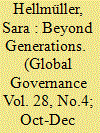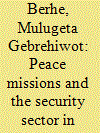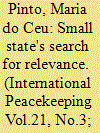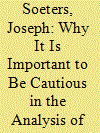|
|
|
Sort Order |
|
|
|
Items / Page
|
|
|
|
|
|
|
| Srl | Item |
| 1 |
ID:
190214


|
|
|
|
|
| Summary/Abstract |
Authors commonly categorize peace missions according to different generations: first-generation missions serving as interposition forces to monitor a cease-fire, second-generation missions with multidimensional mandates, and third-generation missions with enforcement mandates. While the generation typology is useful to show the development of peace missions over time, this article points to four main limitations: ambiguity, reductionism, linear connotations, and restricted applicability. It proposes an alternative categorization distinguishing between a minimalist approach aiming at ending violence, a moderate approach aiming at ending violence and installing some form of good governance, and a maximalist approach aiming at addressing the root causes of conflict. Based on an analysis of all UN peace missions between 1991 and 2020, the article demonstrates how this new classification overcomes the flaws of the generation typology and presents further advantages related to its focus on objectives, its versatility, and its potential for statistical analysis. It thereby allows for a more accurate analysis of UN peace missions and their effectiveness.
|
|
|
|
|
|
|
|
|
|
|
|
|
|
|
|
| 2 |
ID:
154374


|
|
|
| 3 |
ID:
133941


|
|
|
|
|
| Publication |
2014.
|
| Summary/Abstract |
During the cold war period, Portugal was largely absent from participation in United Nations Peacekeeping operations (UNPKO). However, since the end of the cold war, Portugal has reviewed its peacekeeping policy and has made a strong commitment to UN operations. The aim of this article is to determine Portugal's motives for participating in PKO, a costly and hazardous venture, especially for a small country with limited resources. I argue that Portugal's involvement in peacekeeping stems from the belief of policy-makers that such activities promote the country's national interests by enhancing its influence in key international fora such as the UN. However, the article also argues that the concept of national interest is best understood through the lens of constructivism, because constructivist scholarship has largely been interested in how international norms, rules and principles shape and constitute state understandings of practices and order. Peacekeeping has thus been pursued by Portugal as a vehicle for the pursuit of a socially constructed conception of the national interest, rooted in a commitment to particular hegemonic values and conceptions of international peace and security embodied in, and by, organizations such as the UN.
|
|
|
|
|
|
|
|
|
|
|
|
|
|
|
|
| 4 |
ID:
190720


|
|
|
|
|
| Summary/Abstract |
The fascination with special forces could be ascribed to the prominence of their use in contemporary conflicts across the globe. There is, however, a paradox of employing such a highly lethal force in order to pursuit peace. With peacekeeping evolving parallel with the strategic environment, especially in Africa, the trend towards more robust interventions has become prevalent since the end of the Cold War. As such, the requirement for accurate and timely intelligence in peace missions has become crucial. Admittedly, special forces would not necessarily be the soldiers expected to wear blue berets and participate in peace missions. It may come as a surprise to the uninformed, though, to learn that special forces have indeed participated, and are still involved, in peace missions across the globe. Drawing from a case study where special forces have been involved in peace missions under the umbrella of the United Nations in the Democratic Republic of the Congo, this article investigates the utilization of special forces and the role they could play in peace missions in Africa.
|
|
|
|
|
|
|
|
|
|
|
|
|
|
|
|
| 5 |
ID:
185259


|
|
|
|
|
| Summary/Abstract |
This article is a reply to a recent publication by Hasselbladh and Yden in this journal, entitled “Why Military Organizations Are Cautious About Learning?” They argue that there is good reason for military organizations not being very successful in organizational learning. Based on historical experiences related to the military’s bureaucratic character and specific task environment, they argue that military organization’s hesitation to learn is not necessarily dysfunctional. This reply refutes this assertion as it is not based on sufficient knowledge of organizational learning in general, but more importantly because it “scholarly” legitimizes the impeding of attempts to improve military performance in the broad sense of the word.
|
|
|
|
|
|
|
|
|
|
|
|
|
|
|
|
|
|
|
|
|